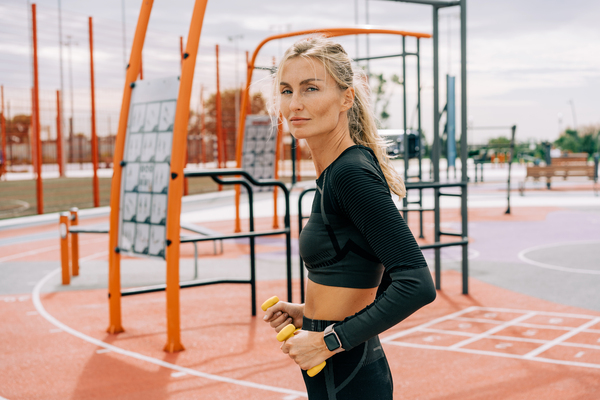Sport is a great thing both to go in for and to enjoy with your friends. It’s a good way to spend your leisure time. It’s no secret that it is good for your body, but are you aware of how good it really is for you and your health?

Why is sport a right thing to do?
Sport is important for the heart, circulation and metabolism
Every form of movement ensures that the heart is challenged more and has to work harder. It pumps faster, the pressure in the blood vessels increases and they dilate. The risk of blood clots in narrow vessels decreases.
Despite the higher stress, the blood pressure drops because the blood can be pumped through the veins more easily and the heart has to work against less resistance. Regular exercise strengthens and strengthens the heart muscles.
And a trained heart can pump more blood into the body with each beat, working more efficiently and improving circulation. It is also important for the smallest blood vessels, because when you move, they are finer supplied with blood and the oxygen uptake increases in all parts of the body.
Damage in the blood vessels can even reverse with regular exercise! Sufficient exercise also protects you from diseases such as diabetes and obesity. The body uses more energy, the fat and sugar metabolism is boosted.
Strengthen bones and muscles through movement
Bones have the ability to adapt to changing mechanical requirements. Your bones build up and increase in strength when subjected to stress. Yet, if they are not exposed to any or only little stress, they can even develop backwards.
Movement increases bone density accordingly. Athletics is particularly important for women because they are statistically more likely than men to develop osteoporosis (bone atrophy) – with osteoporosis, the bone mass continues to degrade.
The result: brittle and unstable bones. Too little activity also means that the cartilage and the joints do not receive enough nutrients, so they become dry, brittle and cracked. Cartilage is “nourished” by synovial fluid.
This serves as synovial fluid and ensures that the smooth cartilage covering is not damaged. This smear is “massaged” into the cartilage through stress and relief, for example through sport. A lack of exercise or incorrect loading leads to undersupply and the joint becomes susceptible to damage. The bad thing: Damaged cartilage cannot be replaced!
It is also important for your tendons and, of course, your muscles: your body begins to break down muscles in your mid-20s when you are not active. Movement protects against the natural breakdown of muscle mass and helps to maintain strength into old age.
Sport as an important booster for your immune system
Did you hear that athletes get sick less frequently than couch potatoes?!
Moderate training sessions harden you, strengthen your immune system and can prevent various diseases in the long term.
Intensive and unfamiliar training loads weaken the immune system, since the body initially perceives extensive, strenuous training sessions as stress and has to adapt to the hard loads during regeneration.
So it is preferable to approach higher loads slowly than to start directly from 0 to 100.
It brings you and your psyche into harmony
Successfully overcome your weaker self and get off the couch, mastered a new best time, rocked a hard sports session – you all know the feeling afterwards: you feel invincible, self-confident and up to all challenges.
What many people regularly forget: in addition to your body, it’s also important for your psyche! It makes you happier, more satisfied and more balanced, you feel better, more attractive, get to know your physical limits and develop greater body awareness overall.
The increased blood circulation and the resulting oxygen supply to the body reduces stress, you can concentrate finer and sleep healthier.
Life expectancy is also increasing. You will not only become more resilient overall physically, but also mentally in the long term.
But it is not only important for the prevention of a stable psyche, but can also provide relief in acute emergencies! Exercise supports the treatment of mental illnesses such as depression and is regularly used in addiction therapy.
It can be an effective non-drug method to reduce or even prevent excessive alcohol and nicotine consumption (by the way: alcohol and sport are not a good combination anyway). It is used here as a kind of substitute satisfaction, which also triggers a good feeling in the body – the happiness hormone serotonin, which is released through exercise, is largely responsible for this.
But what if I don’t want to go in for sport?
However, if you are not a fan of doing sport, you can always become the one who enjoys it as a spectator. Pick your favorite kind of it, choose the most prominent players, follow the news, stay tuned for the fresh updates and share them with your friends. It’s the best option to spend your free time and find people with common interests.
Following the news, you’ll always be provided with up-to-the-minute data on what’s going on. You’ll never miss any particular game.
And we’re here to help you with it.

About us
Our team of sport fans is constantly monitoring the event in the field and delivering the best insights right after they happen. There is no need to gather information from different sources – just visit our website and read important and interesting facts about your favorite teams or players.
We’ve been engaged in different games for almost a decade now, and our squad consists of former players, commentators and experts. Now we’re doing what we like the most.
Wrapping up all the above
Stay tuned for the hottest news in the world of sports – we know how to write and what to share with you! Our team is working 24/7 from all around the globe and is ready to provide you with high-quality and unique content.
